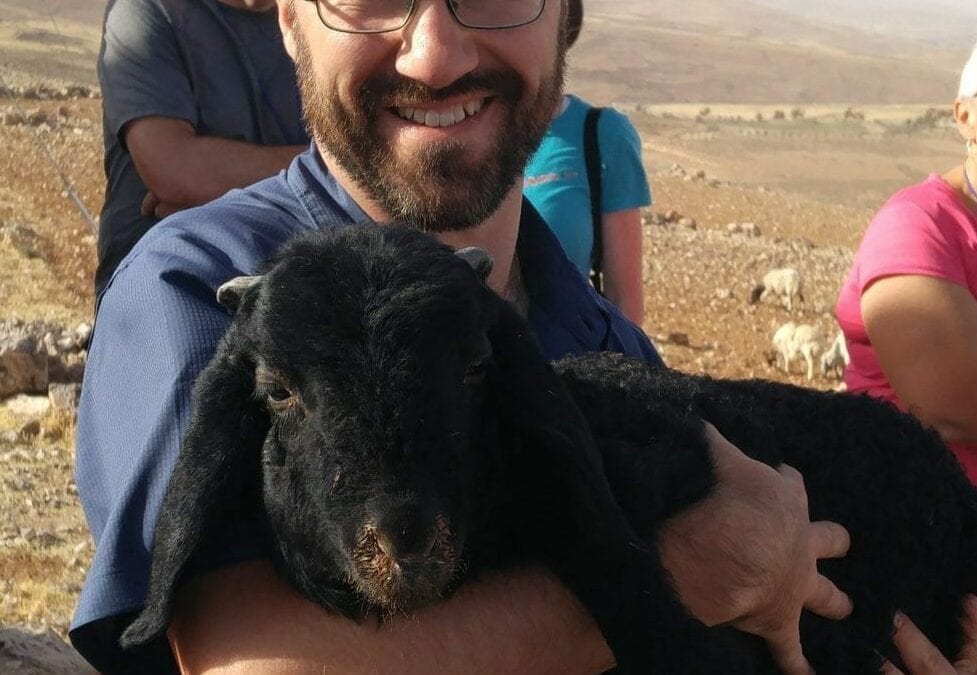Last Wednesday, September 11, was the third ‘anniversary’ of my ordination. I had hoped to post this then, but it’s taken a lot of time and thought to try and pull my thoughts together to reflect on these first three years of ministry. It’s hard to believe that three years has gone by so fast. In all honesty, this is the longest I have ever been in the same position in my working life. With that comes a sense of accomplishment, but also some anxiety as I am entering uncharted territory. Granted, given the always uncertain nature in my previous line of work in the automotive manufacturing industry, only twice did I leave my position of my own volition; and one of them was to make the transition to ministry here at Calvary.
A lot has happened in my three years here.
Not long after my ordination, I had the privilege to travel to the lands of the Bible with Kristal and some colleagues in ministry thanks to a generous grant from a family in British Columbia. This has had a significant impact on how I understand my calling; especially how I read the Bible, and in turn help you (hopefully) to understand and apply it more clearly in our context.
We have also had to navigate some changes together. We have seen new families join us and some depart. I’ve been privileged to participate in weddings, Professions of Faith, Baptisms, and the transitions of some of our loved ones from this life to the next.
I have essentially seen the complete turnover of council since my ordination. After surveys, educating, reflection, and intentional conversation, we now have our first two women deacons. For good reasons, we now use only grape juice at the Lord’s Supper. We have engaged in a visioning process and are now in the process of implementing some of the desired outcomes of the vision. The work seems far from over.
The Reality of Change
Change is, as the saying goes, inevitable. We cannot and do not stay the same. We can resist change and do everything in our power to delay it, but it inevitably comes. Each day we get a little older. Each day brings its own set of challenges, opportunities, and blessings. Some of this is within our control, but much of it is not. Yet, without change we do not grow. God uses the change in our lives to stretch us, challenge us, shape us, and nurture us. This has been his way of relating to us since the beginning of creation.
It is not so much the changes themselves that matter as much as how we respond to change. To seek change for change’s sake is shallow and often comes from a place of boredom. We need to be careful not to call mundane that which is traditional, nor to simply ‘throw the baby out with the bath water’ in hopes of having a fresh start. Doing so says that tradition and familiarity doesn’t matter; or unintentionally communicates that what was previously done is wrong or irrelevant.
To resist or avoid change is stubbornness and comes from a place of fear. Our natural tendency as human beings is to prefer that which is familiar, comfortable, and predictable. We certainly need familiarity and stability in our lives; as it keeps us grounded and cautious about embracing new things too quickly. However, to prefer what is known in favour of keeping things the way they’ve always been stunts our growth and our ability to adapt to a rapidly changing world.
The Response to Change
As we have navigated some of these changes along the way, we have encountered people on either end of the spectrum and many others in between. In reality, we need both in order to live and to lead faithfully. The ‘dreamers’ among us help us to think outside the box and encourage us towards new ideas and projects. Without them, we wouldn’t have ANY of the ministry we currently have in the church. Every ministry the church has ever had started with a dream, an opportunity, and a nudge from God. The ‘traditionalists’ among us help to keep us grounded and proceed with caution when exploring new ideas or practices. They allow us to think carefully before diving in with both feet. I think it’s important for us to remember all of this as we move forward in trying to implement the outcomes of the visioning process in the future.
I’ve heard, too, skepticism from both ends of the spectrum. “Nothing will ever change” is the mantra of those seeing that change is necessary; but fearing that the process of change will be too difficult for the leadership. Change is hard. Leading change is even harder. It certainly is easy to give in when resistance comes. But what would that say about our character as leaders, and as a church if we simply maintain the status quo? If the church is, as the Scriptures state, the “body of Christ” – and that body is made up of its individual members – then how is God’s way of dealing with us as a church any different than his way of dealing with us as individuals? Would any of us ever dare to say to God, “I don’t need to change, I’m just fine the way I am”? Although we may not say it that way, in our sinful nature we often do act that way. But we know in our heart of hearts that it’s wrong. Yet how many of us either say or behave I such a way as to say to God “We don’t need to change [as a church], we’re just fine the way we are; what we have is working just fine the way it is”? I doubt Calvin or the other Reformers would agree.
The end of this coming October marks the 502nd anniversary of the beginning of the Protestant Reformation. The Reformation rightly addressed many practical and theological problems facing the church of that day. Yet, just because we ‘dealt with’ those problems at that time, that doesn’t mean that somehow the church was thereby put back on the straight and narrow and we haven’t had to resolve anything since. This year and next we, in the Reformed tradition, are commemorating the 400th anniversary of the Synod of Dort – a theological and practical outcome of the Reformation – that occurred 100 years later! The early church itself had multiple councils and gatherings to try and sort out heresy from orthodoxy, from which were born the Apostle’s and Nicene Creeds. As the history of the church makes clear: we don’t have this figured out. This side of eternity I doubt we ever will. And, so, discern we must; change we must.
The Necessity of Change
I, personally, have changed a great deal since I first accepted the call here over three years ago. If you had told me even then, that we would be in the place we are now, I would not have believed you. I thought all I was going to be doing was preaching the word, administering the sacraments, and visiting you in your homes; and I was okay with that. Yet, after three years in the role I have come to understand that being the church involves so much more than that. I have come to understand that being a pastor is more than just feeding the sheep, it is helping to lead them as well (pastor is the Latin word for shepherd).
Perhaps we have all-too-easily equated the pastoral office with these three primary roles because of our Western way of shepherding. Here, in a country full of land and grass, we put up fences around sheep and our primary care role is to feed them and protect them from predators. In the Middle East, where the shepherd image is first applied to the leaders of God’s people, there are no fences. Shepherds and their sheep are always on the move, finding new grazing places daily. They may travel within a larger boundary, but there are still no fences. They do this because the land is small, and the grass is scarce. If you keep the sheep in one place too long, they will eat up all the grass and starve. Moving, and following the shepherd’s voice, is a matter of life and death. In applying this imagery to the church, I think it’s pretty clear what our great Shepherd intends for us.
We live in a fascinating and wonderful time where the church has been forced to operate from the margins of society – causing us to reflect deeply and think about who we are and what our real purpose is. There is a great deal of promise in a world where so many have yet to hear the Gospel. By necessity we must keep moving; we must keep changing. We must certainly never lose sight of who we are, and especially whose we are (Heidelberg Catechism: Question & Answer 1). Where we all hope to end up is the same place, but the landscape changes daily and we need to be able to follow in the footsteps of our true Shepherd, Jesus Christ.


Recent Comments